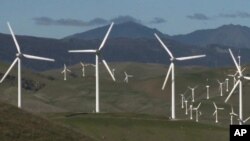The oil disaster in the Gulf of Mexico has intensified the effort to move away from petroleum and other fossil fuels in favor of what is often described as a "green energy future", where clean renewable sources of energy would power the electric grid as well as transportation. Even oil companies now promote wind turbines, solar arrays and bio-fuels as part of their "green energy" initiatives. But energy expert Robert Bryce says much of this is fantasy and that people need to deal realistically with demand for energy.
| Repower America TV ad: "Some people say the answer to our energy lies in the past, they want to burn more oil, more dirty coal. Problem is, it burns carbon and it is killing God's green earth. The future is over here- wind, sun, a new energy grid." |
The televised ad for the non-profit group Repower America lays out a green energy future.
It is one of many calls to embrace renewable energies and end our so-called addiction to oil and other hydrocarbons. In speeches around the country, Robert Bryce challenges that view.
"Hydrocarbons are here to stay. Nine out of 10 units of energy, nine out of 10 units of power that we consume come from hydrocarbons, they are not going away. Second, many of the myths about green energy are just that, they are myths," he said.
Bryce says there may be a larger role for such things as wind, solar and geothermal someday if big advances are made, but to replace the world's current daily use of hydrocarbons, he says, we would need the energy equivalent of more than 23 Saudi Arabias.
Robert Bryce lays out his arguments, with plenty of supporting material, in his new book Power Hungry, The Myths of Green Energy and the Real Fuels of the Future. In the book, Bryce shows that fossil fuels like oil and natural gas have a high energy density. That refers to how much energy each measurable unit contains.
In a VOA interview, Bryce compared the amount of energy produced by a wind turbine and a natural gas well, based on the land each requires.
"The power density of a wind turbine is about one to 1.2 watts per square meter. That is, one watt for every square meter that you cover and with a wind turbine you get about one watt out. Compare that with a natural gas well, just a stripper well, which is considered marginal. It produces a power density of about 28 watts per square meter, so we are talking on an order of 20 times greater power density from a gas well than what comes from a wind turbine."
Bryce also notes that wind turbines rely on rare earth elements like neodymium to generate electricity efficiently and around 90 percent of those rare metals are controlled by one country-China. He says Americans who complain about reliance on foreign oil should consider what it would be like to rely on one foreign country for the entire wind energy sector.
Robert Bryce is not against developing renewable energies; in fact he has solar panels on his own house in Austin. But he says solar is simply not economically competitive.
"I am all for solar. I have invested in the solar panels for a number of reasons, one, this is what I do, I write about the energy business, so I wanted to understand the economics myself," Bryce explained. "But we have to be realistic about what solar can do. It is intermittent and it is relatively expensive compared to conventional forms of electricity."
Bryce argues that policy makers should be looking at two forms of energy already available to power the nation over the next several decades. One is natural gas, reserves of which have grown dramatically in the past few years thanks to new drilling techniques. Natural gas produces about half the carbon of coal in electrical generation and could be used in the transportation sector as well. He also favors expansion of nuclear power.
"Natural gas and nuclear are the two energy sources that I see, moving forward, are the fuels of the future. Why? Because they can provide the scale of energy we need at a cost that we can afford," he noted.
Robert Bryce, managing editor of Energy Tribune and a Manhattan Institute fellow, welcomes debate from anyone who questions his arguments. All he asks is that they look at the facts and do the math.




